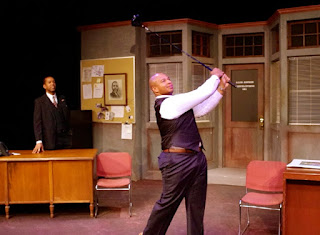Saturday, February 25, 2017
Ensemble hits a hole-in-one with Radio Golf
August Wilson is considered not only one of the greatest of African American playwrights, but of all theatrical writers. His themes of self-identity, racism, loyalty, religion, deception, love, gentrification and historical verification form the centerpiece of his well-received “Century Cycle” about black life in Pittsburgh.
Radio Golf, which was completed only months before Wilson’s death in 2005, is the last installment in his ten play cycle. It is set in the Hill District of the steel city, an area which is undertaking gentrification, as the once all-white area transitioned to primary African American, and now is trending back. It is an area which, in its recent past, had no retail stores and is now experiencing the likes of Starbucks, Whole Foods and Barnes and Noble.
The script came to life in 2005 in a production at Yale Repertory Theatre. It opened on Broadway in 2007 after a short run of 64 performances. Ironically it played at the Cort Theatre, where Wilson’s first Broadway play, Ma Rainey’s Black Bottom, was staged in 1984.
The script won the 2007 New York Drama Critics Circle’s Award for Best Play, and was nominated for a Tony Award.
The play, with strong melodramatic overtones, contains a vocal tone that is almost poetic in its flow. It’s a sound of the past which linguists report “can be heard only faintly now.”
Wilson, in contrast to the earlier plays in the cycle, gives glimpses of the rise of the black man into the “American dream,” which had been reserved for the white man. This is the world of financial investments, real estate, politics and golf, which generally has taken place at segregated country clubs, and played by those of the privileged leisure class. Golf, in which Tiger Woods, whose picture holds a prominent place in the office of Wilkes Realty, along with a photo of Martin Luther King, Jr., has made symbolic inroads into the white world.
The story centers on Harmond Wilkes, who, along with his friend, Roosevelt Hicks, are intent on redeveloping the Hill District for civic pride and financial profit.
Wilkes, an Ivy League educated man, is seemingly on a roll. He is touted to be a candidate for mayor, and would be the city’s first black leader. His wife, Mame, is in line for a major state-level consulting job, and the realty company he had inherited from his father is about to break ground on the Bedford Hills Redevelopment Project, which includes apartment buildings and high-end chain stores.
The project becomes complicated when, Elder Joseph Barlow, an eccentric derelict, claims that a house at 1939 Wylie (a residence which has played major roles in former Wilson plays) has been illegally taken from him.
As the plot develops, Wilks is caught between loyalty to Hicks, his friend and co-investor, his wife Mame and his conscience.
On the day the house is to be demolished, Wilks, in a surprising, but satisfying ending, leaves his office to join a group of Hill residents to protest the demolition of 1839 Wylie. This action brings the Pittsburgh Cycle to a significant and final conclusion.
The Ensemble production, under the adept directing of Terrence Spivey, is outstanding. Well-paced, using the authentic “Pittsburgh black American sound” balanced with the educated language and pronunciation of the emerging black community, and well-textured characterizations, the staging holds the audience’s attention.
Rodney Freeman shines as Elder Joseph Barlow, the seemingly odd elderly man who turns out to be a rebel with cause. This is a finely developed characterization.
Though he stumbles over numerous lines, Theodore M. Snead makes Harmond Wilks live. Kristi Little nicely creates Mame Wilks as a supportive yet success-driven wife.
Leilani Barrett, properly creates Roosevelt Hicks as a dislikable, self-centered cad.
Darryl Tatum nicely portrays handyman and ex-convict, Sterling Johnson, who in many ways is the fulcrum on which the plot turns.
CAPSULE JUDGEMENT: August Wilson, who is one of the most important contemporary playwrights, shines a well-focused spotlight on the history and conflicts of the African American community. Ensemble’s production of Wilson’s Radio Golf is a well-conceived tribute to the man and his message. It is a must see!
Radio Golf, whose first act runs 1 hour and 35 minutes and second act is one hour with a ten-minute intermission, runs Thursdays, Fridays and Saturdays @ 7 pm and Saturdays @ 3 pm and Sundays @ 2 pm through February 26, 2017 at Ensemble Theatre, housed in the former Coventry School, 2843 Washington Blvd, Cleveland Heights. For tickets call 216-321-2930 or go online to http://www.ensemble-theatre.org
Ensemble’s next fully staged production is Cleveland Heights’ playwright Rajiv Joseph’s The North Pool opening April 28th, running through May 21st, 2017.
To see the views of other Cleveland area theatre reviewers go to: clevelandtheaterreviews.com





